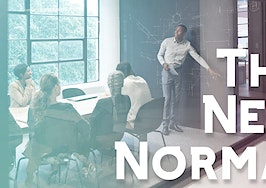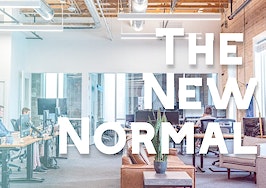“The New Normal” is a multistory Inman series exploring what’s returning to normal after the pandemic fades and what will never be the same. Don’t miss Part 1 What if the brokerage of the future isn’t a brokerage at all?, Part 2 What if real estate agents never go back to the office?, Part 3 What if agent pay was more than just commissions?, Part 4 What if only 3 obstacles stood in the way of the fully digital transaction?, Part 5 What if specialization is the answer? and bonus content What if the past year made real estate easier? And join us June 15-17 when we take the conversation live at Inman Connect.
As we transition back to the office, things obviously won’t be the same as before. Over the course of the pandemic, working at home and using virtual meeting platforms (such as Zoom) have proven to be so beneficial.
Let’s face it — virtual meetings save us time. It’s no secret that agents didn’t love interrupting their days to come in for meetings, and frankly, clients don’t necessarily love it either. If the choice is between schlepping the kids to a babysitter to head to your agent’s office for a brief meeting or clicking a link, which would you choose?
Not to mention that, as brokers, we can record and reuse training videos when onboarding new team members — which, again, saves us all time. Perhaps these forced virtual meetings will continue to be beneficial for all.
Meetings of the future
Here’s what realistic post-COVID real estate meetings could look like.
1. Sales meetings
Virtual
I run a sales meeting once a week. I used to do it at our office and then moved it to a local hotel. Once the pandemic broke out, we moved it to Zoom, and we’ll stick with it going into the future. It’s not as distracting if someone has to leave a physical room, and it makes group participation easier.
Also, the savings of avoiding a commute is significant, and the ability to share your screen and show things that are sometimes hard to see in a conference room is significant. What’s more, the chat feature is not disruptive. And lastly, the ability to record and store those recordings allows new recruits or people who miss the meeting review it at a later date.
2. Listing appointments
In person, with some virtual support
Listing appointments are best in person, not only to physically see the house (which is essential), but even more importantly, also to bond with your clients.
That relationship is important on the listing side, and it’s hard to accomplish through a screen. That said, there’s a lot more you can convey and show over a computer, so I’m trying to achieve a balance or a combination of both.
3. Listing appointment out of town
Virtual with in-person support
Zoom lets you present far better than a phone call. Of course, you still need to physically walk through a property to talk about it and stage it in an intelligent way.
However, if we’re comparing it to having a phone conversation or sending a package — Zoom is just superior.
4. Sales strategy meetings
In person, but with videoconferencing as backup
Currently, I’m doing a combination of the two. Connecting with people and reading their body language is, of course, best done in person. It also forces both parties to be better prepared and more focused in the office.
However, virtual meetings are still valuable for agents and brokers who may miss an appointment or for those who work out of their homes. It’s a great backup to have.
5. Vendor meeting
Virtual meeting, only for the initial appointment
Videoconferencing cuts down on all the vendors who want to meet in person with set appointments in the office or over lunch.
For example, with Zoom, I can schedule a quick meeting, see the vendors on screen, and listen to what they have to offer in 15-20 minutes. It’s much more efficient to do a quick screen share and understand the products through a virtual meeting — no long-drawn-out sales pitch needed.
6. First meeting with buyer
Virtual
Doing this virtually is much better than using the phone. You’ll connect faster. Virtually, you can also go over some strategies to help buyers get more prepared in this extreme seller’s market.
7. Managers meeting
Virtual
We can bring people in everywhere this way. It’s also great for sharing flow charts, graphs and other visuals. We’ll still probably do some in person, but I think that will be reserved for larger, more important meetings.
8. Personal schedule
Flexible
As a broker, I’m going to work from home a few days a week. At home, I’m able to concentrate on my virtual meetings and focus on getting work done without having to deal with a lot of distractions.
However, face-to-face meetings are still critical in this industry; you don’t want to lose touch with your agents, staff and team. We’re not in the computer programming business. Real estate is very much an in-person, people-driven career.
9. Interviewing new agents
Phone, virtual and in person
Actually, start with a phone call, and then move onto Zoom for presentation purposes. After that, we typically do in-person interviews.
A quick, 5- to 10-minute phone conversation will let you know if it’s worthwhile. Zoom is excellent for showing marketing products and back-end systems, and an in-person meeting is always needed to make sure there’s good synergy. That’s when you give the new agent an office tour as well.
10. Training
Virtual and in person
For training, we typically do a combination of virtual and in-person sessions. At first, there’s more training involved with Zoom recordings and meetings. Virtual meetings are a great way to start training, and then it can morph into one-on-one role-playing and sales training in the office.
There’s still a sense of energy that an office space can provide. It’s a place to learn, focus and grow — and I think that’s critical, especially in the beginning stages of training.
11. Support
Virtual
Computer IT support can almost entirely be done virtually. The same can be said about training when it comes to learning how to use contracts, databases and lead generations systems.
12. Mortgage and closings
Mostly virtual
I don’t see the need to do this in person over a big conference table. Over the course of the pandemic, technology has sped up the advancement of these online services, and this trend will continue over the next few years.
A few caveats
- Masks forever: During certain times of the year or to protect a loved one, it will be normal to see people wear masks.
- Sick policy: Stay home! Being a hero now means keeping everyone safe and healthy.
- Greetings: The fist bump, the elbow knock or the bow? Take your pick, but the handshake is over.
As COVID-19 winds down, we will look back and see the multitude of benefits pandemic-driven technology has brought. And hopefully, we will still use that technology as we enter our new normal for good.
Jeff Lichtenstein is the President/Broker of Echo Fine Properties. Connect with him on Facebook or LinkedIn.













